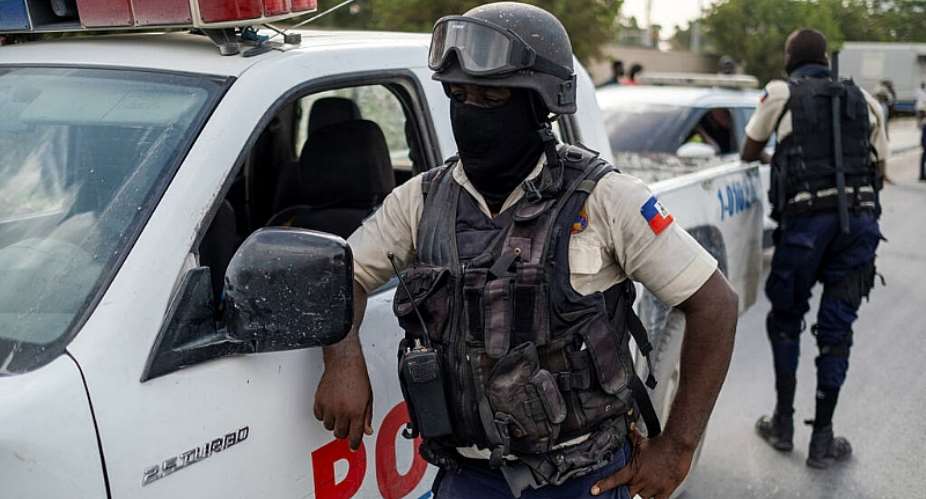Haiti has asked Washington and the UN for troops to secure its ports, airport and other strategic sites following the murder of president Jovenel Moise.
Leon Charles, head of the Police Nationale of Haiti (C), gives orders on a walkie-talkie as the crowd surrounds the Petionville Police station where armed men were accused of being involved in the assassination of President Jovenel Moïse.
FBI and Homeland Security agents have agreed to help with the investigation into Moise's murder but say there are no plans to provide military assistance.
Since he was shot at his home in Port-au-Prince on Wednesday the country has been into a political crisis.
Mathias Pierre, the Elections Minister, said a request for US security assistance was raised during a conversation on Wednesday between interim Prime Minister Claude Joseph and US Secretary of State Antony Blinken.
Haiti also made a request for forces to the United Nations Security Council, Pierre said.
A letter from Joseph's office to the US embassy in Haiti, dated Wednesday and seen by Reuters, requested the dispatch of troops to support the national police in reestablishing security and protecting key infrastructure across the country.
A similar letter, also dated Wednesday, was sent to the UN office in Haiti.
"We were in a situation where we believed that infrastructure of the country – the port, airport and energy infrastructure – might be a target," Pierre told Reuters.
Another aim of the request for security reinforcements would be to make it possible to go ahead with scheduled presidential and legislative elections on 26 September, Pierre said.
The UN political mission in Haiti received the letter and it was being examined, said Jose Luis Diaz, spokesman for the UN department of political and peacebuilding affairs.
“The dispatch of troops under any circumstances would be a matter for the (15-member) Security Council to decide,” he said.
Both the US and Colombia have said they will send law enforcement and intelligence officials to help Haiti after a number of their nationals were arrested for Moise's murder.
But the US has rebuffed Haiti's request for troops. A senior US administration official told Reuters: "There are no plans to provide US military assistance at this time."
The hunt goes on
Police in Haiti said the assassination was carried out by a commando unit of 26 Colombian and two Haitian-American mercenaries. The two Haitian-Americans were identified as James Solages, 35, and Joseph Vincent, 55, both from Florida.
Seventeen of the men were captured - including Solages and Vincent - after a gun battle with Haitian authorities in Petionville, the hillside suburb of the capital Port-au-Prince where Moise resided.
Three others were killed and eight remain at large, according to Haitian police. Authorities are hunting for the masterminds of the operation, they said.
Haitian officials have not given a motive for Moise's killing or explained how the assassins got past his security detail. He had faced mass protests against his rule since taking office in 2017 - first over corruption allegations and his management of the economy, then over his increasing grip on power.
Moise himself had talked of dark forces at play behind the unrest: fellow politicians and corrupt oligarchs who felt his attempts to clean up government contracts and to reform Haitian politics were against their interests.
State of emergency
The Haitian government declared a 15-day state of emergency on Wednesday to help authorities apprehend the killers but has since urged businesses to open up again.
Moise's killing sparked confusion about who is now the legitimate leader of the country of 11 million people, the poorest in the Americas.
“The assassination … has provoked a political and institutional vacuum at the highest level of state,” said Haitian opposition politician Andre Michel. “There is no constitutional provision for this exceptional situation.”
The 1987 constitution stipulates the head of the Supreme Court should take over. But there is no one currently in that role. Nor is there a sitting parliament, following the postponement of elections in 2019.
Just this week, Moise had appointed a new prime minister, Ariel Henry, to take over from Joseph, although he had yet to be sworn in when the president was killed.
Joseph has appeared to take charge of the situation, but Henry – who is viewed more favourably by the opposition – told Haitian newspaper Le Nouvelliste he did not consider Joseph the legitimate prime minister.
(with newswires)





 Akufo-Addo spotted ordering chiefs to stand for his handshake
Akufo-Addo spotted ordering chiefs to stand for his handshake
 Akufo-Addo ‘disrespects’ every chief in Ghana except Okyenhene — NDC Communicato...
Akufo-Addo ‘disrespects’ every chief in Ghana except Okyenhene — NDC Communicato...
 Supreme Court clears way for dual citizens to hold key public positions
Supreme Court clears way for dual citizens to hold key public positions
 Be transparent, don’t suppress the truth – Prof. Opoku-Agyemang to Jean Mensa
Be transparent, don’t suppress the truth – Prof. Opoku-Agyemang to Jean Mensa
 ‘I won’t tell the world I was only a driver’s mate during challenges’ – Prof Jan...
‘I won’t tell the world I was only a driver’s mate during challenges’ – Prof Jan...
 We’ll prosecute corrupt officials of Akufo-Addo’s govt – Prof Jane Naana
We’ll prosecute corrupt officials of Akufo-Addo’s govt – Prof Jane Naana
 [Full text] Acceptance speech by Prof Jane Naana Opoku-Agyemang as 2024 NDC Runn...
[Full text] Acceptance speech by Prof Jane Naana Opoku-Agyemang as 2024 NDC Runn...
 Election 2024: Don’t be complacent, we haven’t won yet – Asiedu Nketia cautions ...
Election 2024: Don’t be complacent, we haven’t won yet – Asiedu Nketia cautions ...
 Election 2024: Stop fighting over positions in Mahama’s next govt – Asiedu Nketi...
Election 2024: Stop fighting over positions in Mahama’s next govt – Asiedu Nketi...
 Prof Jane Naana Opoku-Agyemang will restore dignity of vice presidency – Fifi Kw...
Prof Jane Naana Opoku-Agyemang will restore dignity of vice presidency – Fifi Kw...
